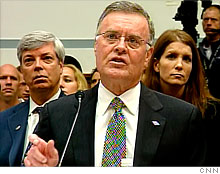BofA's Ken Lewis defends Merrill deal
The Bank of America CEO told lawmakers that risks to the financial system and promise of more federal aid convinced him to go ahead with the Merrill purchase.
 |
| Bank of America CEO Ken Lewis defended the Merrill Lynch purchase in front of regulators, saying "it is easy to forget hust how close to the brink our system came." |
NEW YORK (CNNMoney.com) -- Bank of America chief Ken Lewis told lawmakers Thursday that pressure from federal regulators played an important part in the company's decision to continue with its planned acquisition of Merrill Lynch late last year.
Testifying before the House Committee on Oversight and Government Reform, Lewis said that threats by regulators to remove management or board members were not only credible, but indicated just how strongly the government felt it was to carry out the acquisition.
But he added that this was not the only reason why Bank of America decided to go ahead with the deal. "[Pressure from the government] was a strong influence on my decision, but not the only influence," Lewis told lawmakers.
Lewis, who was peppered with questions from Congressional members from both parties about the deal, said he also worried about the potential negative impact that backing out of the acquisition could have had on the nation's financial system and Bank of America.
He also acknowledged that the promise of additional government aid helped convince the company from declaring a "material adverse change", which would have allowed Bank of America to walk away from the purchase.
Exactly what role the government played in the Bank of America-Merrill Lynch deal has been a topic of intense scrutiny for several months now.
In mid-December, Lewis approached regulators, including then-Treasury Secretary Henry Paulson and current Federal Reserve Chairman Ben Bernanke, threatening to scuttle its planned purchase after discovering the scope of Merrill's losses.
After some behind-the-scenes wrangling, the group reached a final agreement with BofA receiving $20 billion in aid in January, on top of the $25 billion it received as part of the Troubled Asset Relief Program, or TARP. It also got loss guarantees on $118 billion in assets to help the company absorb its purchase.
A subsequent investigation by the New York Attorney General's office on bonuses paid out to Merrill Lynch workers revealed that Paulson told Lewis there would be a change in management should Bank of America back out of the deal. Investigators also learned that Bernanke asked Paulson to threaten Lewis' job.
Emails between Federal Reserve officials regarding Bank of America's (BAC, Fortune 500) bid for Merrill that came to light Wednesday, however, suggested that Lewis may have used the threat of scuttling the Merrill deal as a so-called "bargaining chip" for more government assistance.
"In short, the Treasury Department had provided a $20 billion dowry for a shotgun wedding. But the question may be, 'Who was holding the shotgun?' " committee Chairman Rep. Edolphus Towns, D-NY said Thursday.
Those emails, obtained by Congressional subpoenas of the Fed, also revealed comments by central chief Ben Bernanke, who suggested to another Fed official that Bank of America's "management is gone," if the bank abandoned the deal and later on needed further government assistance.
Lewis said Thursday that regulators had the best intentions in mind, reminding lawmakers of just how dire conditions in the financial markets were last September.
"Even six months later, it is easy to forget just how close to the brink our system came," Lewis said in his prepared remarks.
Still, some members of the House committee worried whether regulators may have overstepped their powers.
"We're here because there's been a serious allegation," said Rep. Darrell Issa, R-Calif, the committee's ranking member. "A number of pieces of evidence have arisen that make us believe that government officials felt necessary to use the power, influence and...potentially threats in order to consummate this deal."
Lawmakers indicated Thursday that the committee planned to call a second hearing to look at the issue, and could ask for Bernanke and Paulson to appear.
The issue of disclosure, specifically whether or not Bernanke and Paulson asked Lewis to withhold details of his discussions with regulators, has also come into question.
During the investigation conducted by the New York attorney general earlier this year, Lewis said Bernanke and Paulson asked him to not disclose the extent of his discussions about the need for more federal support to complete the Merrill purchase with shareholders. Paulson and Bernanke have denied that this was the case.
On Thursday, however, Lewis said that he was never told to keep information that should have been disclosed publicly a secret.
The decision to reveal the Merrill losses and further government aid when Bank of America reported its fourth-quarter loss in mid-January was coordinated simply to announce everything at once, Lewis added.
Nevertheless, that news sparked outrage among company shareholders who faulted Lewis for not telling investors how bad things were at Merrill.
Shareholders acted on their frustration in late April, with a slim majority of them voting to strip Lewis of his title as chairman at the company's annual shareholder meeting.
Despite the scandal surrounding the purchase, there have been indications that the Merrill Lynch purchase is already providing a boost to Bank of America's bottom line.
Bank of America reported a profit of $4.2 billion in the first quarter, helped by Merrill's investment banking and wealth management businesses.
"It seems that much of the public is under the mistaken impression that Merrill Lynch has been costing us money," said Lewis. "That is just not so." ![]()

